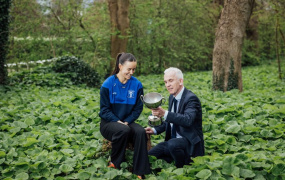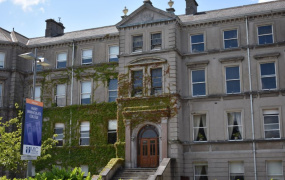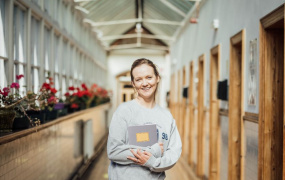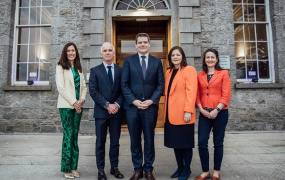Media & Communication Studies
About
Media and Communication Studies can be taken as part of the MIC Bachelor of Arts Degree as a joint honours combination.
Do you spend most of your time on your phone? Do you live a lot of your life online? Do you want to know how to have an impact on life and on others by creating your own content? Do you want to make this your career? Are you curious about people and about the world around you? If so, you will love studying Media and Communication Studies and you should be good at it.
Graduates of Media and Communication Studies are now working in every television station, radio station and newspaper in Ireland for example RTÉ, Newstalk, Spin SW. Many more are working in Public Relations, Marketing, Independent Production houses and for online content providers for example Google, LinkedIn and Facebook. The programme in Media and Communication Studies gives you a solid foundation in theory and in hands-on, production practice so that you are equipped to follow these graduates into the media industry in Ireland and beyond. The programme is designed to present a broad, integrated approach to the study and practice of media and communication systems both old and new. Students develop a critical understanding of the nature of the Media. We look at the development, structure and organisation of Irish and global media institutions, including the music industry, new media, radio, television and film.
Students achieve technical competence and creative proficiency in the use of technologically advanced media equipment and resources. You will learn by hands-on production in the journalism Mac lab and television studio, with in-depth experience of scriptwriting, television production, writing for the press, desktop publishing and state-of-the-art video editing. All of our equipment and software is industry standard and our students do well on work experience and on graduation as a result. Most students get involved in the radio station; Wired Fm and work on independent productions such as short films and features for the local press.
Graduates of Media and Communication Studies here in MIC are currently working in every radio and television station in Ireland, in local and national newspapers, for on-line content providers and in many independent AV and film production units around the country. Other graduates work in the media further afield, in America, Australia, Great Britain and Europe.
Career options include:
- Social Media
- Creative Digital Production
- AV and Film Production
- Radio presenter, producer
- Television producer, director, researcher, editor
- Journalism - print, television, radio and online journalism
- Advertising
- Marketing
- Publishing
- Communications and public relations
- Technical Writing and editing
- Media production
- New media production
- Media research and analysis
- MA in Media Studies
- MA/PhD Research
What you will Study
At undergraduate level, Media and Communication Studies can be taken as one subject in the joint honours BA in Liberal Arts. In first year, students take two introductory modules, along with modules from three other subjects.
Students who choose Media and Communication Studies as one of their two major subjects in second year progress to take a variety of practical, production and theory-based modules. This works out as roughly 40% practical and 60% theory-based studies. We find that this mix equips our graduates well for the workplace, for further study and for the challenges that quickly changing work environments present.
Modules vary slightly each year. See below for a current list of modules in the Bachelor of Arts programme in descending order from First Year onwards:
The module begins with a historical perspective on media, looking at the emergence of national institutions, competition with commercial companies and the challenges of alternative broadcasters. The development and use of broadcast media in Ireland is a core resource in this investigation. It proceeds to examine regulatory regimes that shape the contemporary media landscape. The emergence of international media institutions are explored, along with their consequences in terms of globalisation, hegemony and ideology. The programme continues thematically to cover such issues as propaganda, democracy and censorship.
The module introduces qualitative and quantitative research techniques through practical assignments on student consumption practices. Contemporary case studies are used to illustrate and explain critical theories. These include reality TV game shows, pornography, social media and disinformation.
The creation, interpretation and negotiation of meaning in the mass media and new social media are explored. Critical theories of media and the fundamentals of communication theory are introduced. Media texts are interrogated in order to understand how meaning is produced by producers and received and negotiated by audiences. The role texts play in informing worldviews and individual actions are explored. The relationship between producer, text and audience is deliberated. Theories of Semiotics (Peirce, Saussure) and the Rhetoric of the Image (Barthes) provide the frameworks for an exploration of advertising. The politics of representation and the worlds of storytelling in photojournalism and film are addressed. The challenges of the changing nature of the media landscape and of new knowledge environments are considered to position students as empowered critical users of social media.
This module will introduce students to the pre-production and production stages of programme-making in different media.
To introduce students to the aesthetic and narrative codes of cinema and consider these codes in the wider context of the film industry and the relation between cinema and economics in an international form.
To provide students with a critical understanding of the media from a sociological point of view. To introduce students to key aspects of the debate amongst social scientists about the workings and influence of the media.
To examine the current debates surrounding the process of communication and the exchange of messages. To permit the student to explore the potentialities of the print, radio and television media and to master the skills and disciplines necessary for effective preparation of material for presentation in the context of these media.
Media students may choose to undertake a work placement in the area and/or spend time studying abroad.
A practical course in script-writing. To give students an understanding of the process of communication through drama and develop their skills in writing for film, television and radio. Students will develop their skills through a series of exercises and workshops.
To provide an integrated study of the diverse relationships between media, culture and sociopolitical structures by situating the media in their broad historical and social contexts, and subjecting them to a critical examination in these contextual frames of reference.
To make the student aware of the full potential of audio and video resources as communication and instructional tools; to carry out a number of controlled exercises designed to increase the student’s knowledge of audio and video production equipment, its scope and its limitations, and to enable the student to:
- Identify the characteristics and advantages of a systematic approach to audio and video production
- Operate audio and video equipment appropriate to its intended application
- Set up and operate lighting equipment
- Select and prepare an appropriate method of presentation for a given subject or topic
- Recognise the importance and characteristics of programme format and presentation style
Media and cultural artefacts made specifically for children constitute a significant proportion of output from the media and cultural industries, and are prime exemplars of the industrialisation and globalisation of media and popular cultural forms. They have been the subject of extensive research in Media and Communication Studies, focusing on questions of appropriateness, educational value and the politics of representation in their handling of various social and cultural themes. Another strand of research has focused on how media, both as textual content and an increasingly varied range of technologies, are used by children to engage socially with each other, their families and the outside world. Such research includes both the uses of media aimed specifically at children and media for adult or more general audiences that are nonetheless available to children. It includes both ‘old’ and ‘new’ media, and older media forms available via new media technologies – streaming; social media; phone apps etc.
This module provides students with the opportunity to study this expanding and fascinating field of research. It will enable learning outcomes specific to the study of children’s media and more broadly it will develop students’ knowledge of major theories and concepts in Media and Communication Studies. In particular it critically addresses how childhood and socio-cultural themes pertaining to children are conceptualised within children’s media. It examines key approaches to the production, circulation and consumption of children’s media, utilising approaches drawn from cultural studies and sociology. It critically assesses the politics of representation in popular media texts for children, including film, television and comics. Research on how children engage cognitively and creatively with media content and media technologies is also reviewed.
The module reviews, compares and evaluates a range of critical and historical perspectives on the specificity and social significance of television as a media, technological and cultural form.
It examines:
- Television’s globally varied economic underpinnings, legislative constraints and forms of organisation; its parasitic, symbiotic and transformative relationships with such existing cultural forms as film, literature, theatre and sport.
- Its development and transformation of new cultural forms specific to itself as a medium, in the shape of whole genres (such as ‘reality TV’) and individual landmark contributions to contemporary popular culture.
Students explore:
How changing technologies and modes of delivery have affected the relationships between producers, distributors, legislative controllers and audiences and how the impact of television on social and cultural structures and relations in the 20th and 21st centuries can be assessed.
The module focuses on selected critical perspectives and debates regarding the cultural politics of representation of gender, race, class and national identity in these genres, and how forms of representation relate to broader social and political change within and across nation states.
Students consider the impact of ‘new media’ such as internet/ smart TV accessible platforms like Netflix, Disney+ etc., together with YouTube and social media on how television is consumed, shared and interpreted.
Students undertake a supervised individual research project.
- About
- What you will Study







